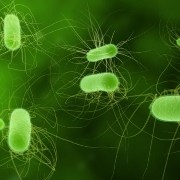 Photo: Getty Images
Photo: Getty Images
With recent news of the E. coli outbreak in Europe -- which by late June 2011 had been blamed for 46 deaths in Germany -- it seems worthwhile to brush up on the sources of foodborne illnesses and to keep in mind that despite 21st century technology in food growing, processing and packaging, food poisoning can happen to anyone.
According to the Centers for Disease Control and Prevention in its 2011 update, each year about 48 million Americans contract a foodborne illness -- that’s one in six. Of that number, 128,000 are hospitalized and 3,000 die from it.
Here are four of the more common bacteria, viruses and microbes associated with foodborne illnesses:
Escherichia coli O157:H7, or E. coli -- This is a bacterial pathogen that lives in mammal intestines and causes problems, for instance, when it is spread microscopically through cattle feces. Ground beef, because it is often processed from many cattle, can harbor E. coli, but in other cases around the world, E. coli has contaminated salami, lettuce, unpasteurized milk or apple juice, and well water. The outbreak in Germany has been tied to sprouts.
Campylobacter -- This type of bacteria, found in bird intestines, is notorious for causing diarrhea when people eat undercooked chicken or other poultry, or eat something that’s been in contact with the juices of raw poultry.
Salmonella -- Found in the intestines of birds, reptiles and mammals, salmonella bacteria often thrive in raw poultry, eggs, meat, and unwashed fruits and vegetables.
Calicivirus, also known as Norwalk or Norwalk-like viruses -- This group of pathogens differs from the previous three by having the ability to spread from one infected person to another. So it can breed illness anywhere in the chain from harvesting the food to preparing it in a restaurant or kitchen.
There are a number of infections that are occasionally foodborne, said the CDC, citing the Shigella bacterium, hepatitis A and the parasites Giardia lamblia and Cryptosporidia. In addition, there are toxins and chemicals that can lead to foodborne illnesses, such as botulism.
Food poisoning symptoms include: diarrhea in varying degrees, including bloody diarrhea; fever; nausea; vomiting; and abdominal pain or cramps. Recovery time can vary from one or two days to longer than a week. Health care practitioners can offer the best advice on preventing dehydration and alleviating the diarrhea. The CDC said antibiotics should be prescribed “only when they are really needed,” given that some food poisoning is the outcome of viruses and that some bacteria have become resistant to antibiotics. Serious cases of food poisoning require immediate attention to prevent organ damage, blood clotting problems and other complications.
The CDC and other organizations have circulated a handy way to remember the rules of proper food handling: “Clean, Separate, Chill, Clean and Report,” referring to such things as washing food, cooking it to the correct temperature, chilling leftovers and cleaning prep surfaces. For other tips on food safety, especially as summer party season begins, see “Food Safety at Summer Picnics and Barbecues” on EmpowHER:
https://www.empowher.com/food-poisoning/content/food-safety-summer-picnics-and-barbecues?page=0,1
Sources:
http://www.acg.gi.org/patients/gihealth/foodborne.asp
http://www.cnn.com/2011/WORLD/europe/06/26/france.e.coli/index.html?iref=allsearch
http://www.cnn.com/video/#/video/health/2011/06/07/gupta.ecoli.consumer.protection.cnn?iref=allsearch
http://www.cdc.gov/ncidod/dbmd/diseaseinfo/foodborneinfections_g.htm
Reviewed June 30, 2011
by Michele Blacksberg R.N.
Edited by Alison Stanton






Add a CommentComments
There are no comments yet. Be the first one and get the conversation started!